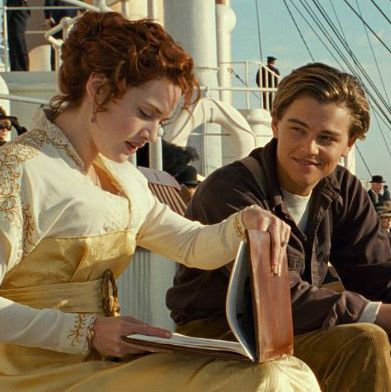
Titanic, which is back in theaters now in honor of its 20th anniversary, is a perfectly good movie, but a little too sad. That’s the conclusion my friend Alanna and I came to one evening this past summer, as we sat down to pick a movie to watch. We both agreed we wanted to watch Titanic for its meaty love story (gross language intended), but didn’t totally feel like dealing with all the dramatic, sinking-to-the-bottom-of-the-freezing-ocean-and-dying stuff. But we soon realized: Titanic doesn’t actually have to be sad. In fact, it can be the rom-com you and your friend Alanna so desperately need if you just turn it off right after Jack and Rose consummate their relationship.
You may be asking yourself, “Isn’t it unsatisfying to stop a movie halfway through?” The answer is no, at least not in this case. See, the dramatic arc of the first half of Titanic is complete enough that they probably shouldn’t have even filmed the second half to begin with. Let’s go back to high-school English class for a moment. Five major points make up a story arc: exposition (where the basics of the story are laid out), rising action (the series of events that begin building toward the story’s central conflict), climax (self-explanatory), falling action (a winding down of the story’s lingering conflicts), and finally, denouement (the final outcome). The first half of Titanic has everything you need in said complete story arc — not to mention forbidden love, contention with societal norms, and some sweet dancing scenes.
For the purposes of this argument, Titanic: The Romantic Comedy begins with Jack (Leonardo DiCaprio) gambling his way onto the Titanic and boarding the ship in a moment of chaos, wherein we get our first glimpse of Rose (Kate Winslet) and her cohorts. This scene kicks the story arc into gear. (While we’re cutting out the entire second half of the movie, let’s also lose the opening scene, where a man whose name is Brock Lovett (we miss you, Bill Paxton) is searching for a hidden treasure deep at the bottom of the ocean. It was a little silly of Rose to throw her extremely valuable — and yet not very beautiful — necklace into the ocean in the first place, and besides, that’s a fixture of the second half of the movie, so it’s irrelevant either way.
The rising action of Titanic: The Romantic Comedy is the growing tension between Rose and Jack (who obviously have the hots for each other) and Rose’s fiancé Cal (Billy Zane, who knows they have the hots for each other and HATES it). Rose, wary of upsetting her mother, plays the aristocrat’s game, both rebuffing Jack and attempting to get close to him without looking like she’s doing anything untoward. She invites him to dinner with her family under the guise that it’s only correct, given the fact that he saved her life. Rising action gives way to climax when, at dinner, her family is so rude to Jack that Rose finally realizes their priorities are never going to align with hers, and that she’s committing herself to a life of misery if she submits to their will.
This realization gives Rose the courage she needs to walk away, and with that, the conflict begins to wind down. Jack takes Rose to a party in third class, and they dance the night away. Rose doesn’t care about being unladylike anymore and dances however she likes. The action falls further, dipping into denouement as they leave the party and enter Rose’s bed chamber. There, she shows Jack the necklace she’s going to chuck into the water in the totally irrelevant part of the movie, and has him draw her “like one of his French girls” (read: naked). With Cal’s bodyguards on the hunt for Rose, they sneak off into the ship’s cargo hold, and make what we can only imagine to be passionate love (given how foggy the windows get) inside a car.
This is the part where you turn the movie off. You’ll be very pleased that the very-much-in-love protagonists end up together. Of course, it was a little predictable, but sometimes that’s just what you need in a movie: a seemingly star-crossed romance that’s actually not star-crossed at all, and doesn’t end with almost everyone dying.

